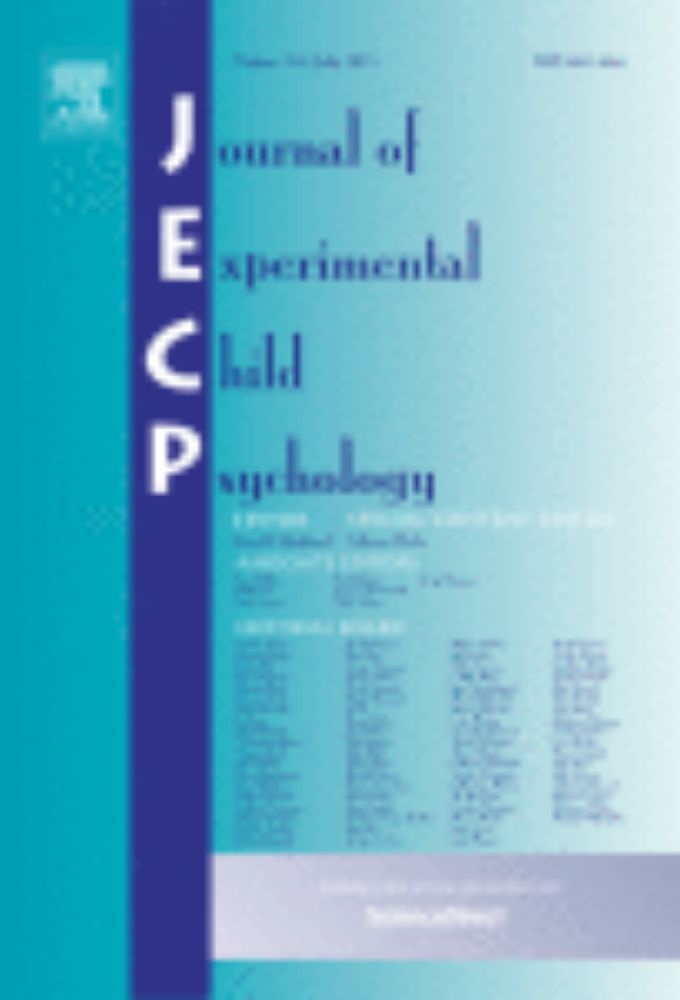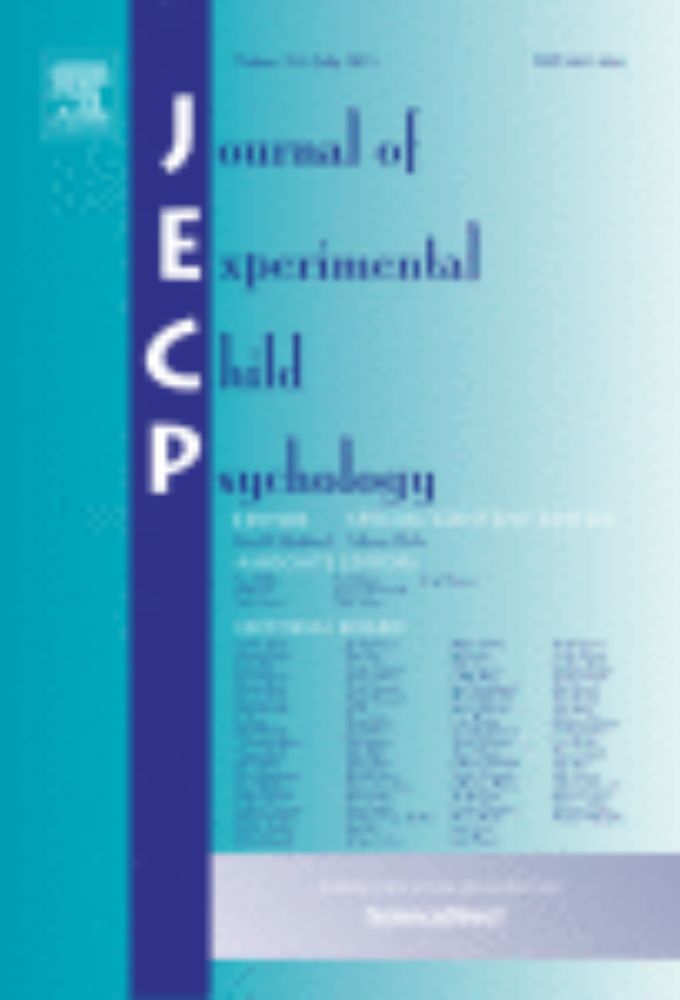
Historical and experimental evidence that inherent properties are overweighted in early scientific explanation | PNAS
Scientific explanation is one of the most sophisticated forms of human reasoning.
Nevertheless, here we hypothesize that scientific explanation is ...
Excited to share our paper:
“Historical and Experimental Evidence that Inherent Properties Are Overweighted in Early Scientific Explanation”
I’m grateful to Zach Horne & my dear advisor @andreicimpian.bsky.social to let me be part of this project, it was a great experience!
doi.org/10.1073/pnas...
23.09.2025 15:35 — 👍 7 🔁 1 💬 1 📌 1
New study alert from L&C Lab led by our former lab member Işıl Doğan!
@mkobas.bsky.social
@aslierciyes.bsky.social
@ecedemirlira.bsky.social
@tilbegoksun.bsky.social
www.tandfonline.com/doi/full/10....
17.07.2025 20:33 — 👍 3 🔁 1 💬 0 📌 0
Recent paper from our lab led by Işıl: Early parental multimodal input is differentially associated with later vocabulary knowledge for preterm & full-term infants
@ecedemirlira.bsky.social @aslierciyes.bsky.social @mkobas.bsky.social @kudilvebilis.bsky.social
www.tandfonline.com/doi/full/10....
17.07.2025 13:19 — 👍 7 🔁 3 💬 0 📌 0
Thank you so much!
23.04.2025 23:09 — 👍 1 🔁 0 💬 0 📌 0
I am so excited to be a part of this wonderful paper led by the very talented @mkobas.bsky.social and my fav collaborator @tilbegoksun.bsky.social. I am generally a big fan of beautiful descriptive statistics and Mert did an amazing job in this paper! Enjoy!
23.04.2025 16:22 — 👍 4 🔁 1 💬 1 📌 0
Teşekkür ederim Akira hocam 😊
20.04.2025 00:23 — 👍 1 🔁 0 💬 0 📌 0
This work highlights the importance of parents' spatial input during infants’ early object exploration for early spatial language development especially for populations like preterm infants who may receive less of it.
19.04.2025 17:58 — 👍 0 🔁 0 💬 1 📌 0
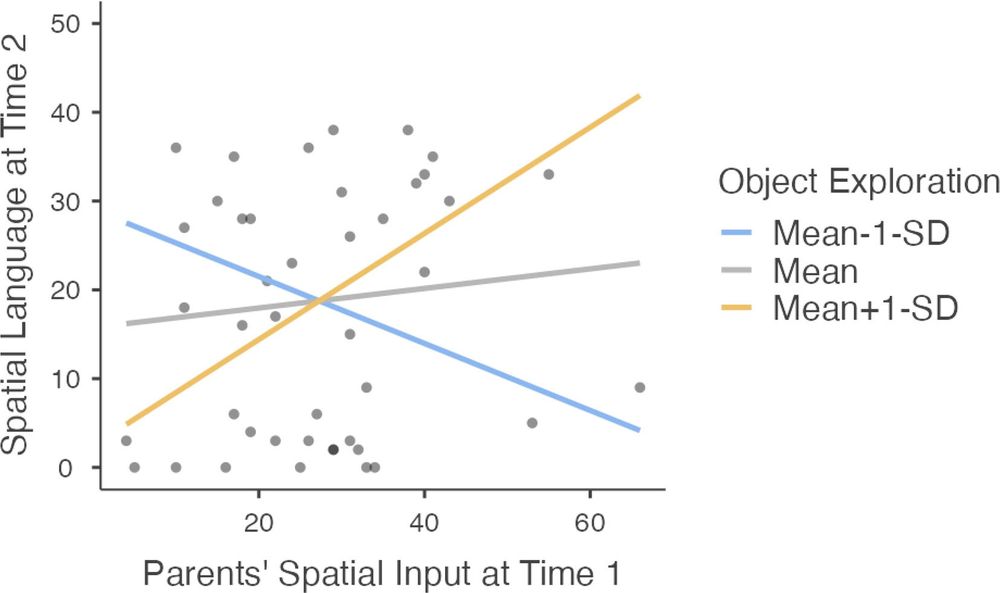
A figure represents the relation between the interaction term and spatial language at Time 2.
We also found that infants who both explored more and received more spatial language input had stronger spatial vocabularies later on.
This suggests a cascading developmental effect shaped by early experiences.
19.04.2025 17:58 — 👍 0 🔁 0 💬 1 📌 0
Importantly, the interaction between object exploration and spatial input at 14 months predicted spatial language at 26 months regardless of whether infants were born preterm or full-term.
19.04.2025 17:58 — 👍 0 🔁 0 💬 1 📌 0
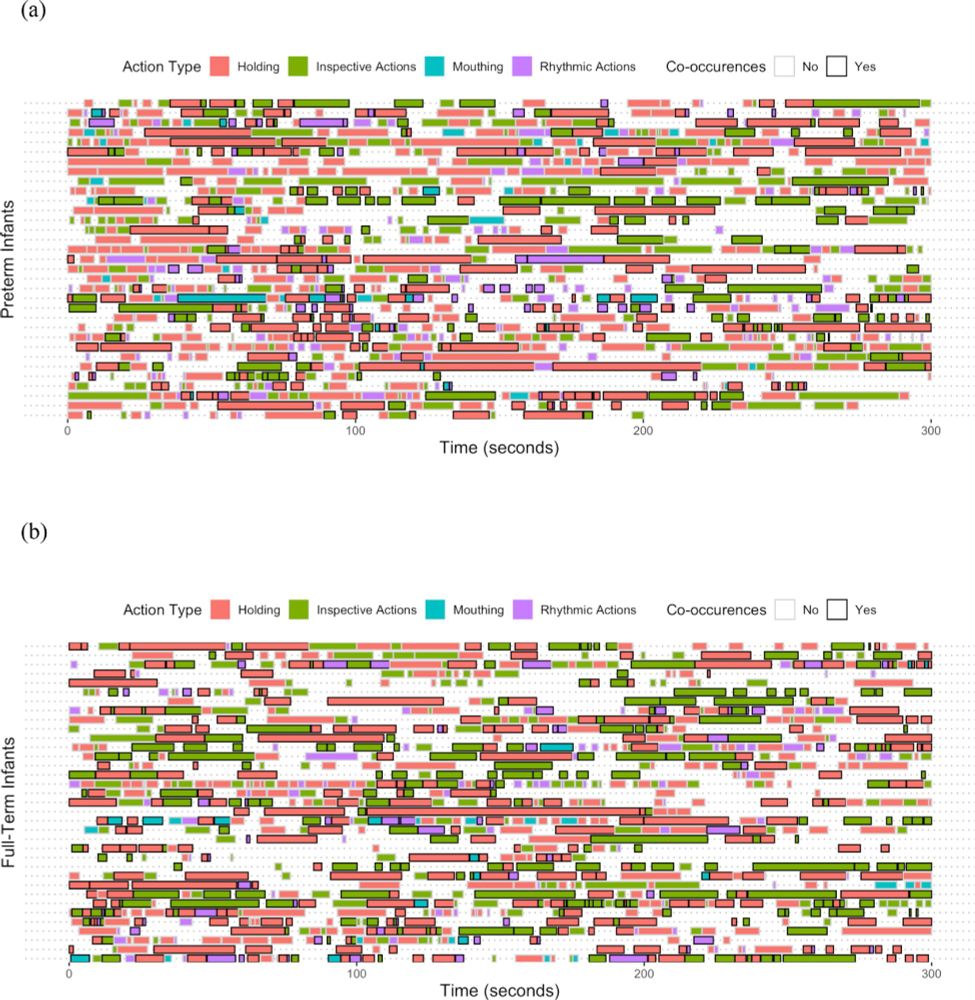
Two figures that represent temporal distribution of object exploration events with co-occurrences
Top figure shows the timelines for each preterm infant’s object exploration events. Different colors represent different action types: holding, inspective actions, mouthing and rhytmic actions. Co-occurences are represented by framed boxes.
The bottom figure represents timelines for each full-term infant’s object exploration events. Different colors represent different action types: holding, inspective actions, mouthing and rhytmic actions. Co-occurences are represented by framed boxes.
On average, spatial input co-occurred with 44% of object exploration events.
This co-occurrence differed by group:
-Preterm: 36.1%
-Full-term: 52.1%
19.04.2025 17:58 — 👍 0 🔁 0 💬 1 📌 0
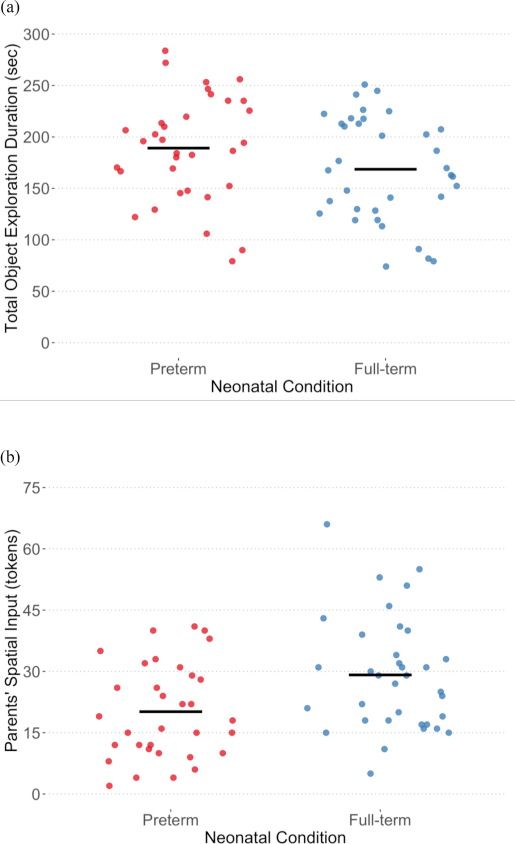
Two figures. The top figure shows total object exploration duration (seconds) -on y axis- by neonatal condition -on x axis-.
The bottom figure shows parents' spatial input (tokens) -on y axis- by neonatal condition -on x axis. Each dot represents a data point. The means are represented by the black lines.
We found that preterm and full-term infants showed similar levels of object exploration.
However, parents of preterm infants used significantly less spatial language during play sessions.
19.04.2025 17:58 — 👍 1 🔁 0 💬 1 📌 0
This longitudinal study followed infants from 14 (Time 1) to 26 months (Time 2). We examined:
1-Infant object exploration at Time 1
2-Parents’ spatial input during play at Time 1
3-Infants' spatial language at Time 2
19.04.2025 17:58 — 👍 0 🔁 0 💬 1 📌 0
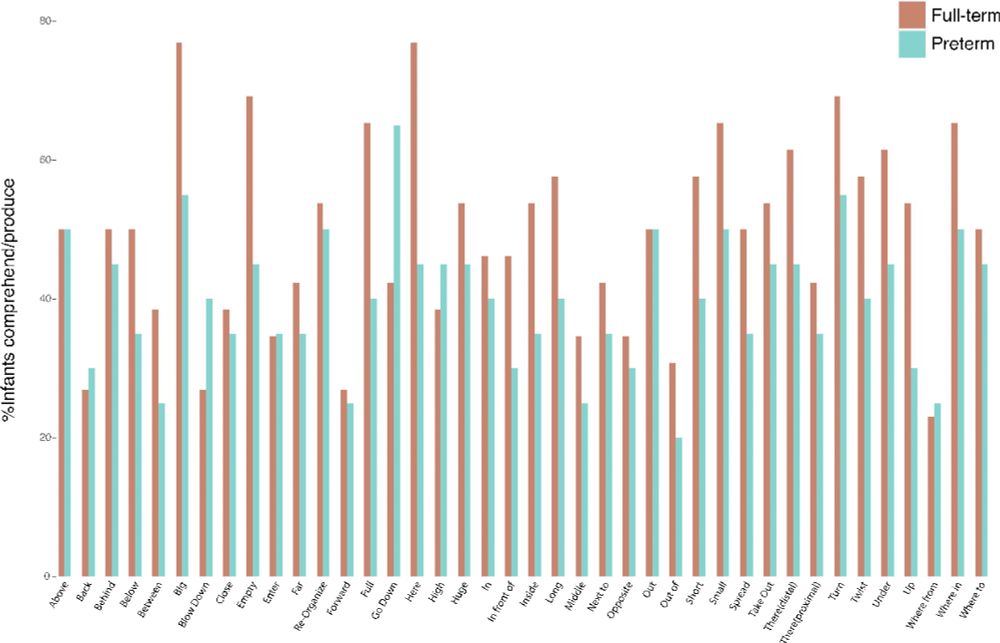
A figure represents percentages of spatial words at Time 2 for preterm and full-term infants. The y-axis shows the percentages infants comprehend and produce. Each bar represents the percentage of infants in each group (preterm or full-term) who could comprehend or produce the corresponding spatial word shown on the x-axis.
You might wonder: do infants actually know spatial words before age 3?
According to parent reports, many do! Our results from CDI showed that infants in our sample were already producing several spatial terms by 26 months.
Here’s a summary from our data👇
19.04.2025 17:58 — 👍 3 🔁 2 💬 1 📌 0
Learning spatial words opens important pathways for later cognitive development.
While much of the existing research has focused on preschoolers and toddlers, the predictors of spatial language development in younger infants remain understudied, and this was our motivation.
19.04.2025 17:58 — 👍 0 🔁 0 💬 1 📌 0
We investigated how early object exploration and parents’ spatial input shape infants’ later spatial language development — in both preterm and full-term infants.
🧸🗣️➡️🧠
19.04.2025 17:58 — 👍 0 🔁 0 💬 1 📌 0
Le chatrox
12.02.2024 15:21 — 👍 1 🔁 0 💬 0 📌 0
Psychologist, Earl Grey fueled Postdoc ☕️ University Children‘s Hospital Zurich 🔍🫀 Congenital Heart Disease #chd
4th-yr PhD: Music Theory & Cognition at Northwestern
☀️Empathetic Music Theory 🎶
🎹🎻🧗♀️🥊📚🎓
The Kempner Institute for the Study of Natural and Artificial Intelligence at Harvard University.
Max-Planck-Institut für Bildungsforschung. Research institution dedicated to the study of human development. Located in Berlin. Belongs to the Max Planck Society. Tweets by the Press Office.
https://www.mpib-berlin.mpg.de/imprint
Founded by Klaus J. Jacobs, the Jacobs Foundation works to ensure that every child is given the evidence-based learning opportunities they need to thrive.
Memory development researcher at Max Planck Institute for Human Development, Berlin
Community Manager for Data-PASS JEDI @dpjedi.org, admin & co-founder at PCI Psych @psych.peercommunityin.org, and one of the people helping SIPS @improvingpsych.org run smoothly. Sometimes also a metascientist doing research on scientific publishing.
Group of Psychologists at Moray House School of Education and Sport, University of Edinburgh, with a combined interest in understanding & supporting the development, learning and wellbeing of children.
Asst Prof @ Ohio State. I study how we perceive and represent the (spatial) world. More here: cogdevlab.org
We are a lab studying how children learn and what they understand about the world. Our lab is at Brown University and we also have researchers at the University of Toronto.
Assistant Professor in Developmental Psychology, Department of Primary Education, University of Thessaly, Greece
Interested in development of (narrative) identity, transition to adulthood, emerging adulthood
He/His
SIPS brings together scholars working to improve methods and practices in psychological science. Join us!
https://improvingpsych.org/membership/
#PsychSciSky #OpenScience
improvingpsych.org
Official source of news from University College Dublin (UCD) - Ireland's Global University. Est. 1854.
One of Europe's leading research-intensive universities
Avid fan of 🌊📚🎬🎨 | Social-Developmental Psychologist & Taighde Éireann - Research Ireland funded PhD researcher studying children’s 🇪🇺🇮🇪 identities & inclusion of immigrants👫
📍Helping Kids! Lab, UCD, Ireland
https://isabelleniccraith.owlstown.net
PI Computational Cognitive Science (BoCoCo) lab in Edinburgh 🏴
https://zhaobn.github.io
Rotating Curator for the @rladies.org community💜
🔗 https://guide.rladies.org/rocur/
This week's curator: TBA
📍Research Lab at @UCDdublin.bsky.social, School of Psychology
|| Children. Empathy. Prosocial. Peacebuilding ||
@aspbelong.bsky.social, funded by Horizon Europe Research Ireland
PI @lauraktaylorphd.bsky.social
https://helpingkidslab.com/ 💻
PhD student in Psychology @ UofT | Studying brain mechanisms of depression vulnerability | Designing web-based interventions to enhance student well-being
PhD in developmental psychology | Postdoctoral Fellow at Stanford’s Center on Early Childhood | Studying how children adapt, learn, and self-regulate in the context of poverty
On the ‘25 academic job market! www.meriahdejoseph.com
PhD Student at Würzburg University
Junior Research Group Networks of Behavior and Cognition
she/her

